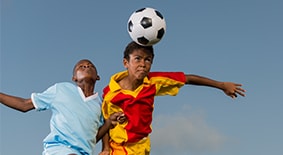Concussion Awareness: The Dangers of Hits to the Head
Updated 4/5/21
From sports injuries to big bumps and falls, kids of all ages are at risk for concussion. Know the signs and symptoms, and learn how to keep your child safe.
Concussions are brain injuries caused by a hard hit to or around the head. Activities most commonly associated with concussion include full-contact sports like football and ice hockey. However, any sport or activity also carries some risk of concussion, such as soccer, lacrosse, cycling or even a fall from a swing set. This is why it’s important for all youth coaches, parents and athletes to know the signs of a concussion and how to respond when a head injury happens.
“We can’t stop concussions from happening, but we can help improve recognition and management of concussions by educating and spreading awareness to individuals and the community, especially athletes, parents, coaches and providers,” says Armand Scurfield, MD, a Sports Medicine Primary Care Physician at Children’s Healthcare of Atlanta. “Our goal is to help protect growing athletes and get them back on the field as soon—and safely—as possible.”
It’s estimated that 1.6 to 3.8 million concussions occur every year, and many of those go unreported or unnoticed. Through better awareness, we can change that and help make sure kids recover appropriately and get the treatment they need.
When a child experiences a hard blow to the head, the brain moves rapidly inside the skull. This force alters the chemicals in the brain and decreases blood flow, impacting the brain’s ability to function properly. Concentration, reasoning, memory, learning and problem-solving all may be compromised by these changes in the brain.
Relative rest, both for the brain and the body, is the best treatment. Unfortunately, there is no way to predict how long someone will remain symptomatic from a concussion. The majority of children with concussions recover within two to three weeks, but it could take days, weeks or months for your child’s brain to completely heal.
Keep in mind that boys and girls tend to respond differently to concussions. On average, girls take a few days longer to recover than boys. Younger children typically take longer to recover from concussions than older children or adults.
According to Dr. Scurfield, the most common symptom associated with concussion is a headache. However, there are many other signs and symptoms. Some of these may not show up until a day or two after the injury.
Signs are conditions observed by other people, and symptoms are feelings reported by the child.
Signs of concussion
- Appears dazed or confused
- Exhibits forgetfulness
- Moves clumsily
- Answers questions slowly
- Shows behavior or personality changes
Symptoms of concussion
- Headache
- Nausea
- Dizziness
- Blurry vision
- Fogginess
- Fatigue
- Concentration problems
“We’re not expecting coaches, parents or referees to be doctors and diagnose concussions,” Dr. Scurfield says. “If an athlete takes a hit to the head and says, ‘I don’t feel good,’ ‘I have a headache’ or ‘I feel dizzy,’ or is acting differently than his usual self with any symptoms after a head injury, that’s enough evidence that a concussion may have occurred. The athlete needs to be pulled from any further activity, at least for the rest of the day, until he can be reassessed by a medical provider.”
Recognizing the signs and symptoms, and taking precautions to ensure recovery is important because even if your child experiences mild initial symptoms from a concussion, he’s at increased risk for second-impact syndrome (SIS). This occurs when a child suffers a second blow to the head—not necessarily a concussive one—before fully recovering from a concussion. SIS can be catastrophic or may be fatal, causing potentially irreversible brain swelling.
What are the warning signs of a concussion in kids?
Watch your child carefully in the days following a head injury. A concussion doesn’t require emergent care, but you don’t want to miss possible severe complications like dangerously increasing pressure in their brain or a possible brain bleed or neck or skull fracture. Call your child’s doctor or seek emergent medical care right away if he has:
- Existing signs that severely worsen.
- Headaches that severely worsen and aren't improving.
- Seizures.
- One pupil larger than the other.
- Severe drowiness or difficulty waking.
- Continued vomiting.
- Severe neck pain or weakness in the arms or legs.
- Trouble recognizing people or places.
- Slurred speech.
- Loss of consciousness.
- Blood or fluid coming from the nose or ears.
- A large bump or bruise on the scalp, especially in infants younger than 12 months.
In Georgia, the Return to Play Act of 2013 states that a young athlete showing symptoms of a concussion should be removed from the field or activity and evaluated by a healthcare provider. The child cannot return to play until he is cleared by a qualified medical professional.
Between 2009 and 2015, all 50 states and the District of Columbia passed laws—many targeting youth sports—to improve prevention and treatment of traumatic brain injuries like concussions. At the sport level, improved equipment, rule changes, stricter enforcement of the rules and improved recognition of injuries are making youth sports safer for youth and teen athletes. Coaches and athletic trainers are making a big difference, too, by helping athletes improve technique, and increase neck strength and early recognition of injuries.
“The medical community has made tremendous strides the past five to 10 years toward improving concussion recognition and management, and we’re striving to continue to get better at helping prevent the potential catastrophic or long-term problems associated with concussions,” Dr. Scurfield says. “Concussions aren’t going away, but we’re going to keep working hard to help make sure everyone knows how to handle them when they occur, and we’ll be here to help get your child back in the classroom and back to playing their favorite sport as quickly as we can.”
More on Keeping Your Athlete Safe
Armand Scurfield, MD, a Pediatric Sports Medicine Primary Care Physician, is board certified in pediatrics and sports medicine. His expertise lies in diagnosing and managing musculoskeletal injuries and concussions in growing athletes. He is a member of the American Academy of Pediatrics (AAP), the AAP Council on Sports Medicine and Fitness, the American Medical Society for Sports Medicine, and the Pediatric Research in Sports Medicine Society (PRiSM). He currently serves as the team physician for Kell High School and Wheeler High School.
This content is general information and is not specific medical advice. Always consult with a doctor or healthcare provider if you have any questions or concerns about the health of a child. In case of an urgent concern or emergency, call 911 or go to the nearest emergency department right away. Some physicians and affiliated healthcare professionals on the Children’s Healthcare of Atlanta team are independent providers and are not our employees.
Contact Us 404-785-KIDS (5437)


